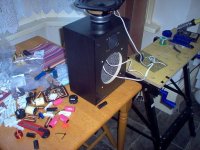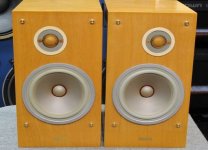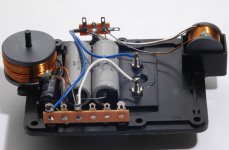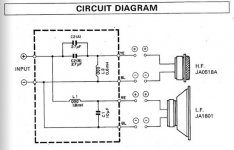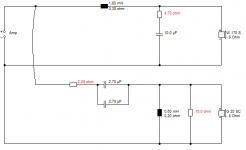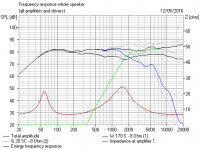Hi I am planning to recap some old electrolytics in pair of Yamaha speakers.
Looking for caps that will do well in Audio circuit
Would Nichicon PW series do well as they are readily available for me.
Another question i have in another pair of speakers a 100v 3.9 ?F electrolytic... and i cannot seem to find good replacement... any ideas
Looking for caps that will do well in Audio circuit
Would Nichicon PW series do well as they are readily available for me.
Another question i have in another pair of speakers a 100v 3.9 ?F electrolytic... and i cannot seem to find good replacement... any ideas
Hi I am planning to recap some old electrolytics in pair of Yamaha speakers.
i have in another pair of speakers a 100v 3.9 ?
You want only nonpolar capacitor types for a speaker crossover.
Compare Capacitors: Madisound Speaker Components
Use two nonpolar capacitors in parallel, 3.9uF = 3.3uF + 0.56uF.
Last edited:
Probably you should consider what will fit first. And what you want to spend.
NPE type:
4uF Alcap 4.00uF Low Loss 100VDC Electrolytic Capacitor - Alcap Capacitors Low Loss 50V/100V - Alcap ClarityCap Solen Capacitors
10uF Alcap 10.00uF Low Loss 100VDC Electrolytic Capacitor - Alcap Capacitors Low Loss 50V/100V - Alcap ClarityCap Solen Capacitors
250V poly type:
3.9uF 3.9 fd Monacor MKP Capacitor
10uF 10 fd Monacor MKP Capacitor
NPE tends to be cheaper and smaller. 10uf poly can get big with higher voltage types, but 250V works for me. Modern tin solder is a different game from the old leaded fluxed stuff and needs a hotter iron around 40W. Cleanliness is essential as is speed of working, say, below 5 seconds heating. Modern solder tips should be tinned the first time they warm up to avoid oxidation.
Both doable here. I just measured 4X 20-y-o NPE 3.3uF 10% types. They were all near 3.7uF, which is fine. 3.3uF Polys were spot on. Whatever the view on capacitor types, I can never hear much difference. The general view by people in the trade is to renew with like for like. Avoids tonal changes, because NPE does have a small built-in resistance around 0.5-1 ohm, which is why they get warm under heavy load in bass filters.
But hey, it's the hobby to try stuff.
NPE type:
4uF Alcap 4.00uF Low Loss 100VDC Electrolytic Capacitor - Alcap Capacitors Low Loss 50V/100V - Alcap ClarityCap Solen Capacitors
10uF Alcap 10.00uF Low Loss 100VDC Electrolytic Capacitor - Alcap Capacitors Low Loss 50V/100V - Alcap ClarityCap Solen Capacitors
250V poly type:
3.9uF 3.9 fd Monacor MKP Capacitor
10uF 10 fd Monacor MKP Capacitor
NPE tends to be cheaper and smaller. 10uf poly can get big with higher voltage types, but 250V works for me. Modern tin solder is a different game from the old leaded fluxed stuff and needs a hotter iron around 40W. Cleanliness is essential as is speed of working, say, below 5 seconds heating. Modern solder tips should be tinned the first time they warm up to avoid oxidation.
Both doable here. I just measured 4X 20-y-o NPE 3.3uF 10% types. They were all near 3.7uF, which is fine. 3.3uF Polys were spot on. Whatever the view on capacitor types, I can never hear much difference. The general view by people in the trade is to renew with like for like. Avoids tonal changes, because NPE does have a small built-in resistance around 0.5-1 ohm, which is why they get warm under heavy load in bass filters.
But hey, it's the hobby to try stuff.
Last edited:
Thx guys for advise .
As i am restoring two sets of speakers with one needing new 3.9uf caps and both 10uf bi caps.
I decided to go and replace the 10uf caps with NICHICON UEP serie electrolytics and the pair of 3.9uf electrolytics with save value Panasonic polys
I give them a try and see how they work and post results when work is done.
As i am restoring two sets of speakers with one needing new 3.9uf caps and both 10uf bi caps.
I decided to go and replace the 10uf caps with NICHICON UEP serie electrolytics and the pair of 3.9uf electrolytics with save value Panasonic polys
I give them a try and see how they work and post results when work is done.
I think you are misunderstanding things here:
http://www.mouser.com/ds/2/293/e-uep-879967.pdf
Looking at the 10uF/100V, it really doesn't look suitable for a bass filter. 11mm x 8mm. You might get away with this for a tweeter which is much lower power, but really, you should buy audio grade.
It's the power factor, Tan delta which matters, and here it is 0.1-0.25.
http://www.mouser.com/ds/2/293/e-uep-879967.pdf
Looking at the 10uF/100V, it really doesn't look suitable for a bass filter. 11mm x 8mm. You might get away with this for a tweeter which is much lower power, but really, you should buy audio grade.
It's the power factor, Tan delta which matters, and here it is 0.1-0.25.
Because it's likely too small and will get hot and fail rapidly in whatever your unspecified Yamaha speakers are. These things have an ESR or resistance so they heat up. It could be a few watts in a bass filter.
Loudspeaker NPE capacitors are designed to have minimum ESR at 10kHz which is another consideration.
You choose components based on the application. In loudspeaker crossovers they can dissipate several watts. That's a lot. It could cause distortion. You might burn your house down if you mess up.
rayma's link was a good one: Compare Capacitors: Madisound Speaker Components
The links I gave you were also suitable. These are what we use in loudspeakers:
A little 5" 25W speaker with 50V Alcap NPE types. 4uF and 8uF as it goes. Rather puny coils.
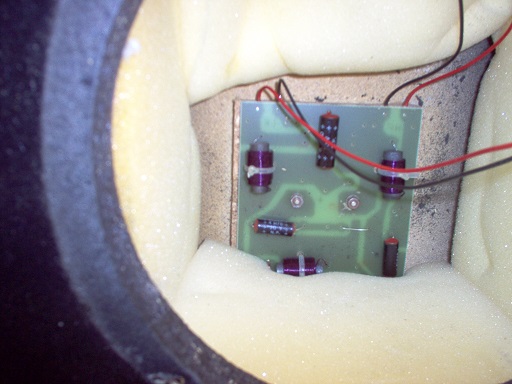
A 50W 8" speaker with considerably overspecified 630V MKP capacitors, but we like quality.
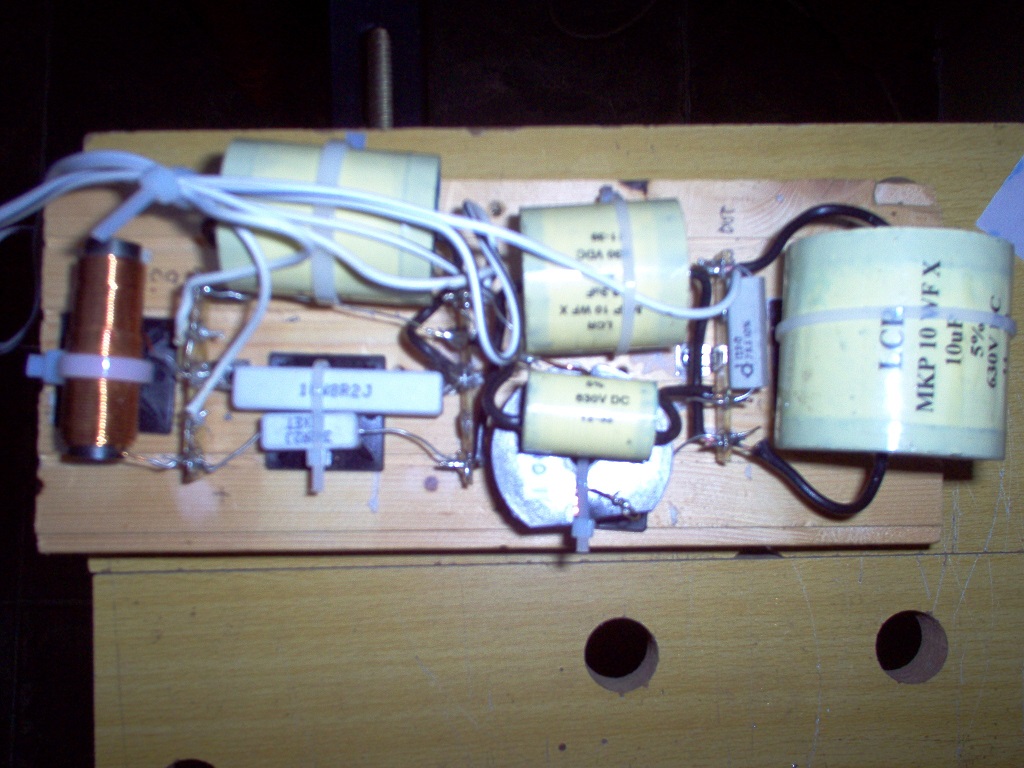
Loudspeaker NPE capacitors are designed to have minimum ESR at 10kHz which is another consideration.
You choose components based on the application. In loudspeaker crossovers they can dissipate several watts. That's a lot. It could cause distortion. You might burn your house down if you mess up.
rayma's link was a good one: Compare Capacitors: Madisound Speaker Components
The links I gave you were also suitable. These are what we use in loudspeakers:
A little 5" 25W speaker with 50V Alcap NPE types. 4uF and 8uF as it goes. Rather puny coils.
A 50W 8" speaker with considerably overspecified 630V MKP capacitors, but we like quality.
I'm really not sure what you are doing here. And nor are you in all probability. 
This is what happens when you overdrive a KEF Q70 crossover, and they don't have an easy life at the best of times, being often covered in foam in a poorly ventilated box:
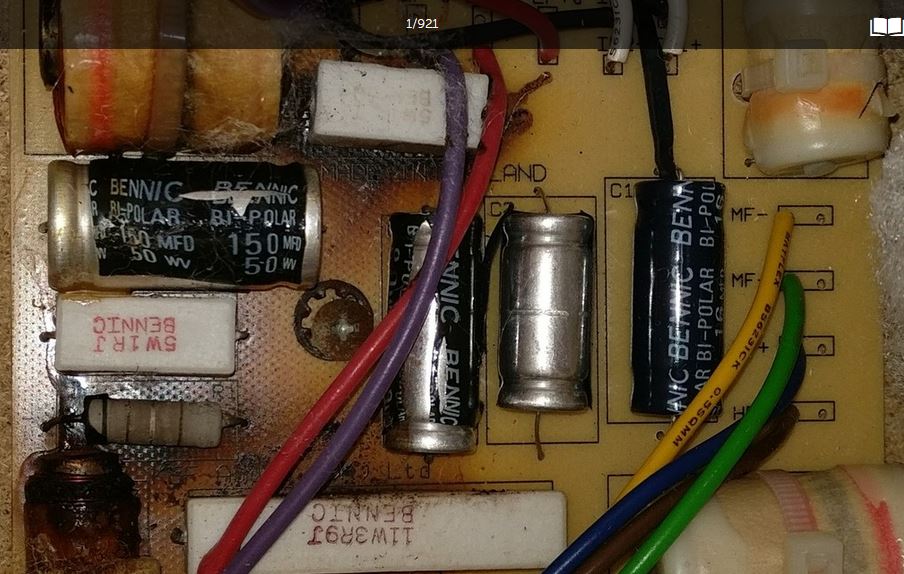
I can only wish you good luck.
This is what happens when you overdrive a KEF Q70 crossover, and they don't have an easy life at the best of times, being often covered in foam in a poorly ventilated box:
I can only wish you good luck.
Are you posting from a mobile phone? It feels like it.
You could have helped your cause by being more informative. What model Yamaha were these speakers? Where are the photos of the existing crossovers? Otherwise it's all guesswork and vagueness and unfocussed in reply, you follow?

This crossover was largely built with parts from the Maplin store. But more suitable and cheaper parts are available at Wilmslow Audio and Falcon Acoustics and Blue Aran.
You also need at least a 40W soldering iron kit, some long nosed pliers and some small wire cutters. Again from Maplin. Below is my own workshop.
If you want to learn stuff, this is useful:
DIY-Loudspeakers
Computer simulation for beginners:
Downloads
boxsim-db.de | Boxsim Projektdatenbank
You could have helped your cause by being more informative. What model Yamaha were these speakers? Where are the photos of the existing crossovers? Otherwise it's all guesswork and vagueness and unfocussed in reply, you follow?
This crossover was largely built with parts from the Maplin store. But more suitable and cheaper parts are available at Wilmslow Audio and Falcon Acoustics and Blue Aran.
You also need at least a 40W soldering iron kit, some long nosed pliers and some small wire cutters. Again from Maplin. Below is my own workshop.
If you want to learn stuff, this is useful:
DIY-Loudspeakers
Computer simulation for beginners:
Downloads
boxsim-db.de | Boxsim Projektdatenbank
Attachments
You know where you can stick YOUR attitude! 
As it goes you are talking to someone who knows those little Yamaha NS10 speakers: The Yamaha NS10 Story |
I think we had somebody a while back who found them too shrill at the top end. I doubt if messing around with capacitors will fix it, but new NPE's do no harm if man enough for the job. In fact Yamaha went almost over the top in paralleling two big NPE 2.7uF. Should give what we call a low ESR.
Which is a good thing. So here, to my ungrateful Yamaha NS10 audience, is a reasonable stab at taming the top end on this cheap and cheerful monitor. Real changes will do far more than swapping components, IMO. I would use 10W resistors in the bass filter and 3W in the tweeter filter. I think I was allowing for MKP-type capacitors here, which are always a bit brighter, but I really can't remember.
As it goes you are talking to someone who knows those little Yamaha NS10 speakers: The Yamaha NS10 Story |
I think we had somebody a while back who found them too shrill at the top end. I doubt if messing around with capacitors will fix it, but new NPE's do no harm if man enough for the job. In fact Yamaha went almost over the top in paralleling two big NPE 2.7uF. Should give what we call a low ESR.
Which is a good thing. So here, to my ungrateful Yamaha NS10 audience, is a reasonable stab at taming the top end on this cheap and cheerful monitor. Real changes will do far more than swapping components, IMO. I would use 10W resistors in the bass filter and 3W in the tweeter filter. I think I was allowing for MKP-type capacitors here, which are always a bit brighter, but I really can't remember.
Attachments
Last edited:
bashstreet, I get frustrated with putting in a huge amount of work for no result. I'm human. And quite good at this topic. I've been doing it for 45 years at work and in College at an advanced level in analog and digital filters.
95% of the threads here lead nowhere. Look at the amount of work I put into this one: Newbie need some help rebuilding dead KEF Q70
It was actually quite a simple fix costing less than £20 plus tools. Did I get any feedback. NO.
For people who do stick with my advice, I have NEVER had a failure. And if there is anything people don't understand I hang on in there.
Now for sure I get into arguments sometimes. Like AllenB, I think that you can tune a crossover by ear. IF you know how they work. Mostly I enjoy the cheap end, I'm a real socialist in that respect. But in the end, it's just a bit of fun.
95% of the threads here lead nowhere. Look at the amount of work I put into this one: Newbie need some help rebuilding dead KEF Q70
It was actually quite a simple fix costing less than £20 plus tools. Did I get any feedback. NO.
For people who do stick with my advice, I have NEVER had a failure. And if there is anything people don't understand I hang on in there.
Now for sure I get into arguments sometimes. Like AllenB, I think that you can tune a crossover by ear. IF you know how they work. Mostly I enjoy the cheap end, I'm a real socialist in that respect. But in the end, it's just a bit of fun.
I am absolutely sure that you have very high knowledge on the topic we been discussing and i have learned from you (I.E importance of thermal properties of capacitors , physical size their surface area ,heat dissipation ESR etc)
I am beginner who is interested learning electronics and wish to do small simple projects to get started and i am happy to learn.
Also like i have said i do appreciate the effort you have given to advise me of the potential pitfalls.
As simple as these projects might be for you they are not for someone who has no electronics background and is starting hobbyist.
I understand knowledge can breed feelings of impatience toward ones who do not yet have same level of knowledge.
There are topics where i might feel similar toward you in my fields of expertise but i try stay professional.
All in all i do appropriate your help but i like keep things "kosher"
I am beginner who is interested learning electronics and wish to do small simple projects to get started and i am happy to learn.
Also like i have said i do appreciate the effort you have given to advise me of the potential pitfalls.
As simple as these projects might be for you they are not for someone who has no electronics background and is starting hobbyist.
I understand knowledge can breed feelings of impatience toward ones who do not yet have same level of knowledge.
There are topics where i might feel similar toward you in my fields of expertise but i try stay professional.
All in all i do appropriate your help but i like keep things "kosher"
My own main scientific interests are Quantum Field Theory and Number theory.
But loudspeakers are a fun application of Physics. Never perfect, IMO. It's built into the Universe and your own boomy room. But you can get close to a good sound.
I don't think I ever condescended with a capacitor upgrade. It was one of the first things I ever tried for improving a speaker with a simple coil/cap crossover. A Mordaunt Short MS10i, IIRC. It had a simple 3.3uF or 2.2uF NPE which I swapped for a MKP type. TBH, it didn't do much.
This is a hobby which benefits from having good tools and measuring gear, like any other engineering trade. This is a £70 inductance and capacitance meter I find useful.
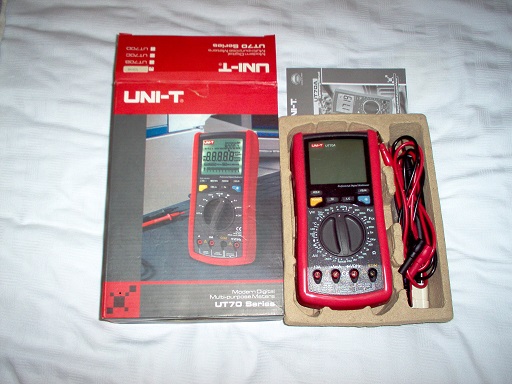
And a good stock of components.
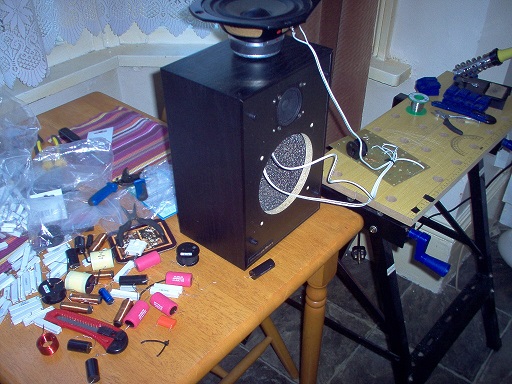
It's a serious investment of money. As for speaker design, well Mister Troels Gravesen will have a go at most things.
DIY-Loudspeakers
Including upgrades on old designs.
But loudspeakers are a fun application of Physics. Never perfect, IMO. It's built into the Universe and your own boomy room. But you can get close to a good sound.
I don't think I ever condescended with a capacitor upgrade. It was one of the first things I ever tried for improving a speaker with a simple coil/cap crossover. A Mordaunt Short MS10i, IIRC. It had a simple 3.3uF or 2.2uF NPE which I swapped for a MKP type. TBH, it didn't do much.
This is a hobby which benefits from having good tools and measuring gear, like any other engineering trade. This is a £70 inductance and capacitance meter I find useful.
And a good stock of components.
It's a serious investment of money. As for speaker design, well Mister Troels Gravesen will have a go at most things.
DIY-Loudspeakers
Including upgrades on old designs.
- Status
- This old topic is closed. If you want to reopen this topic, contact a moderator using the "Report Post" button.
- Home
- Loudspeakers
- Multi-Way
- Changing Audio related capacitor in speakers
